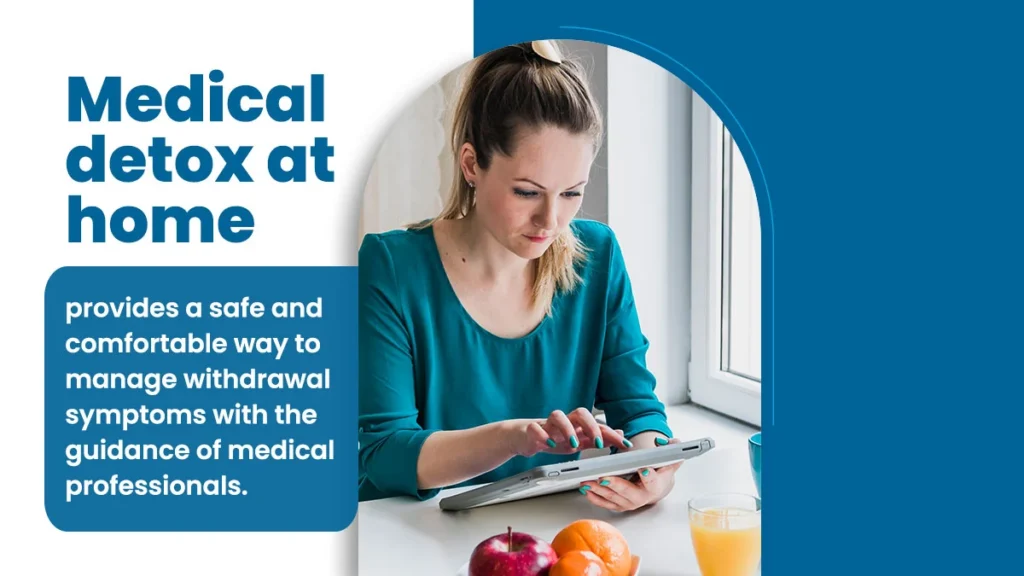Medical detoxification, or detox, is a crucial first step for those seeking recovery from substance abuse and addiction. Traditionally, detox is performed in a hospital or specialized facility, but an increasing number of people are exploring the option of doing it at home.
This method can be both convenient and comfortable, allowing individuals to start their recovery journey in a familiar environment. However, it’s essential to understand that home detox requires careful planning and medical oversight to ensure safety and effectiveness.
Keep reading as we explore what medical detox at home entails.
Key Takeaways
Medical detox at home can be a safe option for those wanting to manage withdrawal with the guidance of healthcare professionals. This article covers:
- Preparing for detox includes consulting a healthcare provider, gathering necessary supplies, and creating a safe space.
- Following a structured plan, managing symptoms, and seeking support are crucial for a successful in-home detox.
- Continuing care with a structured plan, engaging in long-term strategies, and making healthy lifestyle choices are vital.
Contact The Haven Detox-New England at (844) 933-4145 to begin your recovery journey with our specialized detox and treatment services.

Introduction To Medical Detox At Home
Medical detox is a process where individuals stop using drugs or alcohol and allow their bodies to clear these substances. It often involves medical support to manage withdrawal symptoms safely. Typically done in a hospital or treatment center, medical detox can also be done at home with proper planning and supervision.
Detoxing at home offers comfort and privacy, allowing individuals to stay in a familiar environment. It can be more convenient and cost-effective compared to staying in a rehab facility. Home detox can also reduce the stress of being away from family members and daily routines, making it easier for some people to focus on recovery.
However, at-home detox carries risks, including severe withdrawal symptoms or health complications. Without professional supervision, it’s harder to manage potential emergencies, and there’s a chance of relapse. It’s essential to speak with a healthcare provider before starting home detox to ensure it’s safe for your situation.
Preparation For At-Home Medical Detox
Before starting an at-home medical detox, it’s essential to plan carefully to ensure safety and effectiveness. Here’s how to get ready.
Consulting A Healthcare Provider
Before beginning drug detox at home, it’s important to talk to a healthcare provider. They can evaluate your health and offer guidance on the best approach for your situation. A doctor will help you understand what to expect and how to handle potential withdrawal symptoms. They can also recommend medications or treatments to ease the detox process and monitor your progress.
Necessary Supplies And Equipment
Gathering the right supplies and equipment is essential for a successful home detox. This may include medications prescribed by your doctor, hydration solutions, snacks, and comfort items like blankets or pillows. Make sure to have a first aid kit and any other items your healthcare provider suggests. Having these supplies ready ensures you are prepared for any needs during the detox.
Creating A Safe And Supportive Environment
Creating a safe and supportive space at home is vital. Ensure your space is clean and free from any substances you’re detoxing from. Set up a quiet area where you can rest and relax. Inform close family or friends about your detox plan so they can offer support and help if needed. A positive and understanding environment will aid your addiction recovery and help you stay focused on your goals.
Steps To Conduct Medical Detox At Home
Once you have prepared for drug or alcohol detox at home, it’s important to follow a structured approach to ensure a smooth process. Here’s a guide on what to do next.
Follow A Structured Plan
Begin detox by following a structured plan. This often involves gradually reducing your substance use rather than going cold turkey. Your healthcare provider will create a plan tailored to your individual needs. Sticking to this plan helps manage drug and alcohol withdrawal symptoms and makes the process safer.
Manage Withdrawal Symptoms
Be prepared to manage withdrawal symptoms, which can vary from mild to severe. Your doctor may prescribe medications to help with discomfort. It’s essential to follow their instructions closely. Keep track of your symptoms and report any severe or unexpected changes to your healthcare provider.
Stay Hydrated And Nourished
Staying hydrated and nourished is crucial during detox. Drink plenty of water to help flush toxins from your body. Eat balanced meals with plenty of fruits, vegetables, and proteins to support your body’s recovery. Proper nutrition helps maintain energy and strength throughout the detox process.
Sleep And Rest
Getting enough sleep and rest is essential for the recovery process. Your body needs time to heal, and rest supports this process. Create a relaxing bedtime routine and ensure your sleeping environment is comfortable and quiet. Aim for 7-9 hours of sleep each night to help your body recover.
Engage In Physical Activity
Engaging in light physical activity can be helpful during detox. Activities like walking or stretching can boost your mood and energy levels. Avoid intense workouts, as your body may be more sensitive during detox. Regular, gentle exercise helps maintain physical and mental health.
Practice Stress Management
Managing stress is important for a smooth detox experience. Use relaxation techniques such as deep breath exercises, meditation, or yoga to reduce stress. These practices help calm your mind and body, making it easier to handle withdrawal symptoms and stay focused on recovery.
Seek Support
Having support from friends, family, or support groups can make detox easier. Share your goals and progress with those you trust. They can provide encouragement and help you stay on track. Talking to others who have been through detox can also offer valuable insights and motivation.
Follow Up With The Healthcare Provider
Regular follow-ups with your health professional are important to track your progress. Schedule check-ins to discuss how you’re feeling and make any necessary adjustments to your detox plan. Your provider will ensure you’re on the right track and provide additional support if needed.
When To Seek Professional Help
At-home detox can be effective, but there are times when professional help is necessary. Here is when reaching out to an addiction treatment provider is important.
Severe Withdrawal Symptoms: If you face severe symptoms of drug or alcohol withdrawal, it’s time to seek medical help. Symptoms like cravings, intense nausea, seizures, or extreme agitation can be dangerous and require medical intervention.
Inability To Manage Symptoms: When you find it difficult to manage your symptoms despite following your detox plan, professional support is needed. A healthcare provider can offer additional treatments and adjustments to help you cope effectively.
Mental Health Concerns: If you encounter mental health issues, such as severe anxiety, depression, or suicidal thoughts, seek help right away. Professionals can provide necessary interventions and support to address these concerns.
Lack Of Support: A lack of support from family or friends can make detox more challenging. If you feel isolated or unsupported, reaching out to addiction specialists or support groups can provide the encouragement and assistance you need.
Inconsistent Progress: If your progress seems inconsistent or if you’re not seeing improvements as expected, consult a healthcare provider. They can reassess your situation and adjust your treatment plan to better meet your needs.
Remember, reaching out for professional support is a sign of strength, not weakness, and it can lead you to a healthier, happier, and more fulfilling life.
Post-Detox Care And Maintenance
After completing a medical detox, continuing care is essential for long-term success. Here’s how to maintain your progress and support your recovery.
Continuing Care Plan
Developing a continuing care plan is crucial for maintaining sobriety after detox. This plan may include follow-up visits with your healthcare provider and adherence to any prescribed medications. It’s important to keep track of your progress and make any necessary adjustments with professional help. A solid care plan ensures you stay on track and addresses any issues early.
Long-Term Strategies For Sobriety
Long-term strategies are key to staying sober. Participating in therapy sessions and support group meetings can provide ongoing support and guidance. Therapy helps you work through any underlying issues that contributed to your drug or alcohol addiction, while support groups offer a community of people with similar experiences. Both resources are valuable for building a strong foundation for sobriety.
Healthy Lifestyle Choices
Adopting healthy lifestyle choices is crucial for maintaining your sobriety. Eating a balanced diet, exercising regularly, and getting enough sleep all contribute to overall well-being. Avoid situations or people that might trigger drug cravings. In addition, incorporating stress management techniques, such as mindfulness or relaxation exercises, also helps maintain mental and emotional balance.
Frequently Asked Questions (FAQs)
Is it safe to detox at home without medical supervision?
Detoxing at home without medical supervision can be dangerous, especially for substances like alcohol, opioids, or benzodiazepines. Dangerous withdrawal symptoms, such as seizures or dehydration, can occur and might be life-threatening. Medical supervision provides a safer environment, offering medication and support to manage symptoms. It’s crucial to consult a healthcare professional before attempting detox, as they can guide you on the safest approach for your specific situation.
What should I expect during a medical detox?
During a medical detox, you can expect to be monitored by healthcare professionals in a safe, controlled environment. They will manage withdrawal symptoms and provide prescription medications if needed to ease discomfort. Staff will regularly check your vital signs, ensuring your safety and stability. You’ll also receive emotional support and possibly counseling to help you through the process. The goal is to safely rid your body of substances while minimizing any potential health risks.
How dangerous is home detox from alcohol?
Home detox from alcohol can be very dangerous. Without medical attention, severe withdrawal symptoms like seizures, hallucinations, and delirium tremens (DTs) can occur, which can be life-threatening. Other risks include dehydration, heart complications, high blood pressure, and intense anxiety. Without proper medical care, these symptoms can escalate quickly, leading to serious health consequences. Always consult a healthcare provider before attempting to detox from alcohol at home.
Detox With Care At The Haven Detox-New England
Are you ready to take control of your life and overcome substance use disorder (SUD)? The Haven Detox-New England is here to support you every step of the way.
At our treatment facility, we begin your recovery with a medically supervised detox program designed to safely clear your body of harmful substances. From detox, we move you to our residential treatment, where you’ll find a safe space to heal. Our program includes therapy, medication management, life skills training, and peer support. Plus, if your drug or alcohol abuse has led you to develop mental health disorders, our dual diagnosis program offers the comprehensive care you need.
Don’t wait to start your journey to recovery. Call us now at (844) 933-4145 and take the first step toward achieving a high quality of life. Your new beginning starts today!
Verify Insurance
Let’s get you or a loved one help with a few simple steps.
-
Medical Detox




